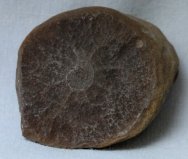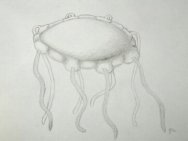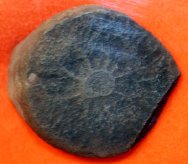Octomedusa
pieckorum
Phylum Cnidaria,
Class Scyphozoa, Coronatida
Geological
Time: Pennsylvanian (~300 million years ago)
Size (25.4
mm = 1 inch): 15 mm across (including tentacles) on a 40 mm by 33 mm
nodule half
Fossil Site:
Pit 11, Francis Creek shale, Braidwood, Illinois (Mazon Creek)
Code: AW47
Price: Sold
 Description:
The Mazon Creek deposits of the region near Braidwood, Illinois
rival the other famous Lagerstatten of the Burgess Shale, Solnhofen,
and Liaoning for the variety of detailed life preserved. Many
exquisitely-preserved specimens are found in the ironstone nodules
that make up the deposits. The majority of collecting areas are
the spoil heaps of Description:
The Mazon Creek deposits of the region near Braidwood, Illinois
rival the other famous Lagerstatten of the Burgess Shale, Solnhofen,
and Liaoning for the variety of detailed life preserved. Many
exquisitely-preserved specimens are found in the ironstone nodules
that make up the deposits. The majority of collecting areas are
the spoil heaps of  abandoned coal mines, the most famous of which
is Peabody Coal Pit 11. Pit 11 now serves as a cooling pond for
the Braidwood nuclear power plant, but with over 100 other localities,
specimens still come to light. The example here is a small jellyfish
known as Octomedusa pieckorum. It derives its generic name from
the fact that it has 8 tentacles which vary from mere nubs to
ones that extent out to a length equal to the diameter of the
bell; several are visible here. The indistinct cross-like structure
is thought to be the quadripartite mouth. Members of the Coronatida
today contain the smallest extant jellyfish. This one represents
an opportunity to add this rare jellyfish to your collection
of Mazon Creek specimens.. abandoned coal mines, the most famous of which
is Peabody Coal Pit 11. Pit 11 now serves as a cooling pond for
the Braidwood nuclear power plant, but with over 100 other localities,
specimens still come to light. The example here is a small jellyfish
known as Octomedusa pieckorum. It derives its generic name from
the fact that it has 8 tentacles which vary from mere nubs to
ones that extent out to a length equal to the diameter of the
bell; several are visible here. The indistinct cross-like structure
is thought to be the quadripartite mouth. Members of the Coronatida
today contain the smallest extant jellyfish. This one represents
an opportunity to add this rare jellyfish to your collection
of Mazon Creek specimens..
|
|


